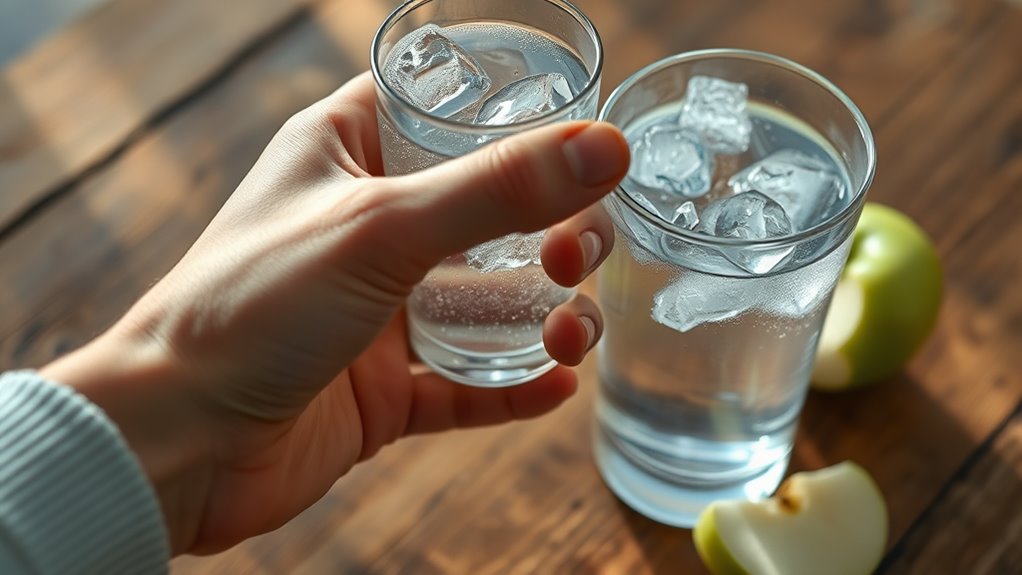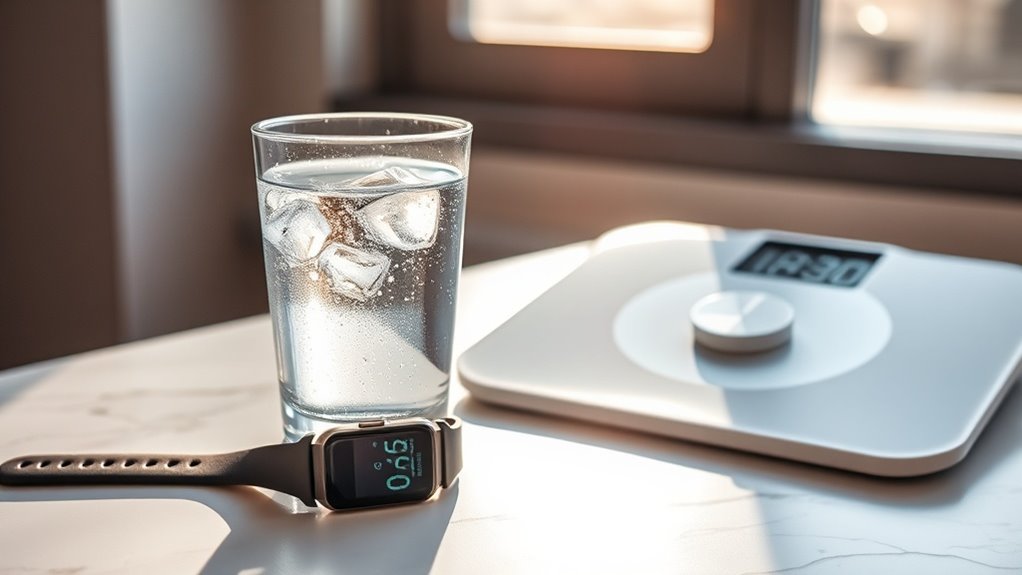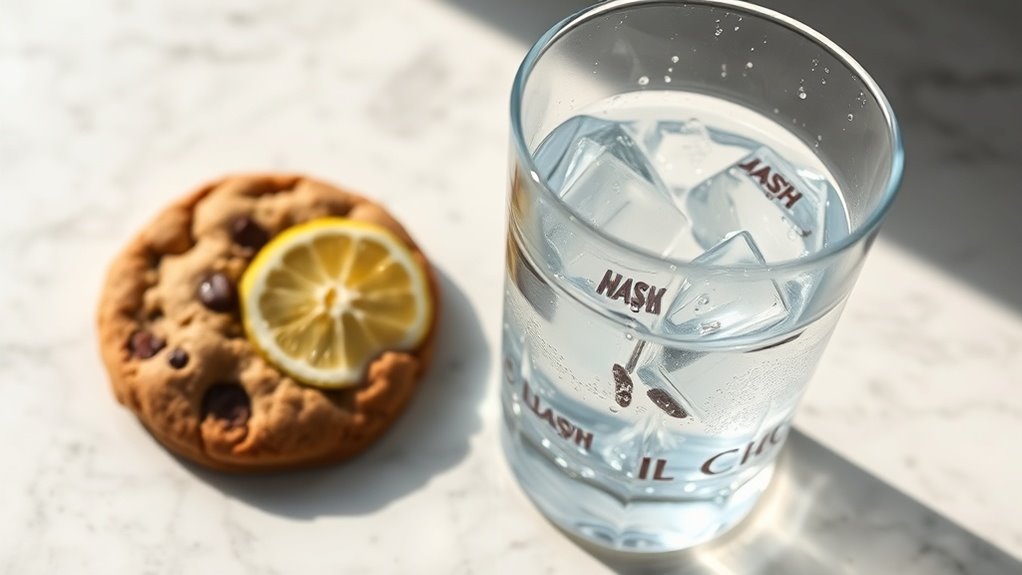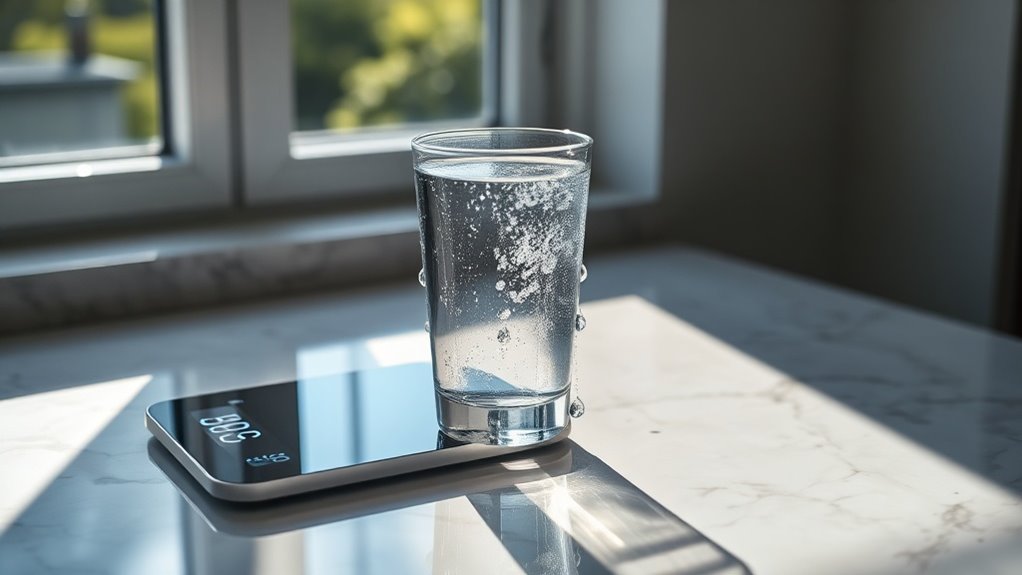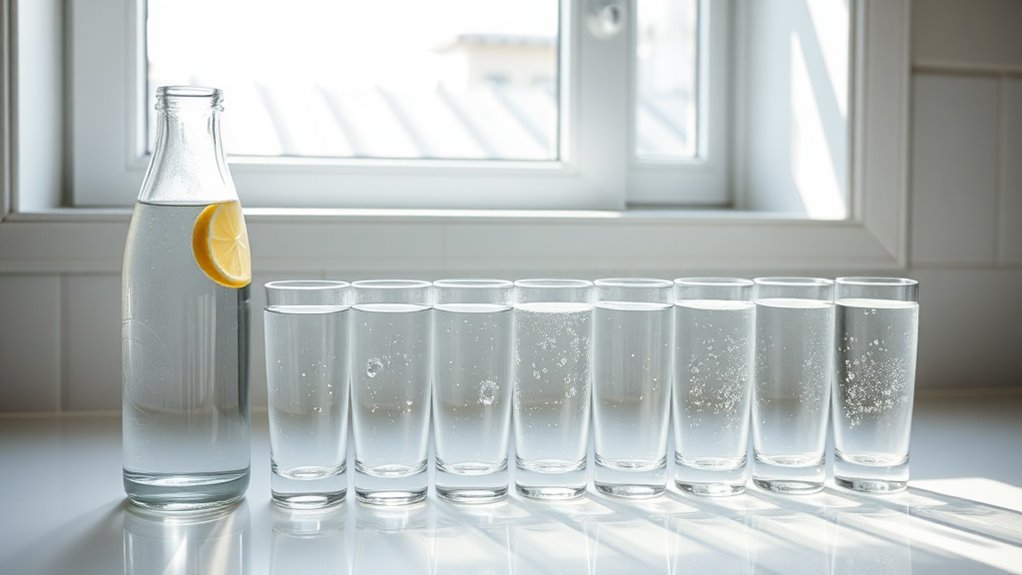Can Water Really Curb Your Appetite. I Tried It
Imagine how dramatically a simple glass of water can slash your cravings before meals! You’ve probably questioned if it’s truly effective, and from my trial, it is. As you weigh trying it yourself, you’ll uncover surprising science and strategies that enhance satiety.
The Science of Water and Appetite
Drinking water before meals can reduce your appetite by filling your stomach and signaling fullness to your brain.
Research demonstrates that water enhances hunger control by suppressing ghrelin, the hormone that triggers hunger, while promoting satiety through stomach expansion.
You activate these effects by consuming adequate water, which studies show leads to reduced calorie intake during meals.
For example, a review of trials indicates that pre-meal water intake lowers overall food consumption by up to 13%, aiding weight management.
This evidence-based approach makes water a simple tool for effective hunger control. Additionally, proper hydration supports metabolism and hunger cues, further enhancing your appetite management strategy.
My Personal Water Trial
You start your water trial by increasing daily intake to gauge its effects on appetite, drawing from simple, observable changes in your routine.
As you maintain this habit, you’ll likely experience reduced hunger signals, backed by studies showing hydration’s role in satiety. Additionally, staying hydrated can help manage hunger cravings throughout the day, which is essential for effective weight loss.
Now, let’s explore how these effects unfolded in my experience.
Starting the Trial
With the aim of testing water’s potential to suppress appetite, I’ve launched my personal trial by incorporating a structured hydration routine into my daily life.
You’ll begin by setting clear goals, such as consuming 500ml of water 30 minutes before meals, based on research from nutrition experts like the Academy of Nutrition and Dietetics. This evidence-based approach tracks intake using a simple app, ensuring consistency without overwhelming your schedule.
Active monitoring helps maintain hydration levels, drawing from studies showing improved body awareness. Remember, consistency is key; start small to build sustainable habits, making the trial straightforward and effective.
Effects on Hunger
Early in the trial, increased water intake reduces hunger levels, as personal observations align with studies from the Academy of Nutrition and Dietetics showing that consuming 500ml before meals boosts satiety and minimizes cravings.
You’ll experience this when you drink water before eating, leading to smaller portions and fewer between-meal snacks, based on my trial results. This approach, supported by evidence, helps you maintain a balanced diet.
- Feel your stomach expand with each cool gulp, creating a sense of immediate fullness.
- Notice cravings fade like mist, as hydration quiets your appetite signals.
- See meals feel more satisfying with less food, enhancing your control.
- Track energy levels rising steadily, without sudden hunger pangs disrupting your day.
- Discover how simple sips transform eating habits, fostering a calmer, more mindful routine.
Effects on Hunger Levels
Drinking water before meals often curbs hunger by filling the stomach and triggering fullness signals in the brain.
You experience this effect as water expands in your stomach, sending satiety messages to your hypothalamus, which regulates appetite.
Studies, such as those from the Journal of the Academy of Nutrition and Dietetics, confirm that drinking 16 ounces of water before eating reduces hunger levels by up to 20%, helping you consume fewer calories without discomfort. This simple habit leverages your body’s natural responses, making it an evidence-based tool for appetite control in everyday scenarios. Additionally, hydration optimizes metabolic processes that further support effective calorie burning and weight management.
Daily Hydration Strategies
You can begin your morning hydration routine by drinking water first thing to boost metabolism and suppress early hunger pangs. Timing your water intake throughout the day, such as before meals, helps you stay satisfied and reduces overeating based on studies showing hydration’s role in appetite regulation. Additionally, starting the day with hydration can boost metabolism and enhance fat oxidation, making it an effective strategy for weight management. Finally, moderating evening fluid intake prevents nighttime disruptions while maintaining hydration’s benefits for overall control.
Morning Hydration Routine
While many people underestimate the importance of morning hydration, it kickstarts your daily water intake and supports appetite control.
Starting your day with water helps maintain optimal hydration, potentially reducing hunger by filling your stomach and enhancing metabolic functions.
-
Imagine waking up and sipping a cool glass of water, feeling its refreshment as it rehydrates your body after a night’s rest.
-
Picture yourself adding a slice of lemon to your water, visualizing the citrus enhancing flavor while aiding digestion.
-
Envision filling a reusable bottle at dawn, its clear contents symbolizing a fresh start to your hydration routine.
-
Think of standing by the window with your morning drink, the sunlight glinting off the glass as you quench your thirst.
-
Visualize tracking your intake with a simple app, seeing the progress bar fill as you commit to this vital habit.
Daily Water Timing
Effective daily hydration strategies build on your morning routine by spacing water intake evenly throughout the day. You maintain steady hydration by aiming for 8-10 glasses total, distributed across mid-morning, lunch, and afternoon breaks.
Research from the Journal of the Academy of Nutrition and Dietetics indicates that regular sipping curbs hunger signals by keeping you fuller longer.
Set reminders on your phone or link intake to activities like meetings or walks to ensure consistency. This approach stabilizes energy levels and supports appetite control without overeating triggers.
Track your progress daily for optimal results.
Evening Fluid Intake
Evening fluid intake rounds out your daily hydration plan, ensuring you maintain steady fullness to curb late-night cravings.
Research indicates that evening water consumption enhances satiety, reduces ghrelin levels, and prevents overeating by keeping you hydrated and satisfied.
It’s a simple, evidence-backed strategy to support appetite control without added calories.
-
Imagine sipping a cool glass of water while watching your favorite show, feeling a gentle wave of fullness wash over you.
-
Picture pouring herbal tea as you unwind, its steam rising like a soothing mist to signal your body it’s time to relax.
-
Envision adding cucumber slices to your water bottle, creating a refreshing visual that tempts you to drink more.
-
See yourself enjoying a hydrating soup for dinner, its vibrant colors and warmth evoking a sense of nourishment and calm.
-
Visualize placing a water pitcher on your nightstand, its clear contents reminding you to hydrate before sleep for a rested morning.
Insights From Real Experiences
Many people have shared how drinking water before meals helps them feel fuller and eat less, drawing from everyday experiences that highlight its practical benefits.
You’ve likely heard similar stories from friends or online, where a simple glass reduces the urge to overeat. Evidence from user reports shows water occupies stomach space, triggering fullness signals quickly. When you test this approach, you may notice it diminishes snack cravings and supports portion awareness. This straightforward method, backed by anecdotal data, empowers you to manage appetite more effectively in your routine. Additionally, staying hydrated plays a crucial role in understanding satiety, helping to ensure that you are not mistaking thirst for hunger.
Long-Term Observations on Satiety
While short-term practices like drinking water before meals can curb immediate hunger, long-term observations show that consistent hydration enhances your sense of satiety over time.
Evidence from studies, such as those in the Journal of Nutrition, indicates that regular water intake regulates hormones like ghrelin, helping you maintain fullness and reduce overall calorie intake.
-
You’ll wake up feeling naturally satisfied, skipping impulsive breakfast grabs.
-
During busy days, hydration keeps mid-afternoon cravings at bay, sustaining your energy.
-
At dinner, you’ll notice portions shrink as fullness sets in quicker.
-
Over weeks, late-night snacking fades, promoting restful sleep and balance.
-
Months in, you’ll visualize a slimmer silhouette from sustained appetite control.
-
Moreover, staying hydrated can mimic hunger and help you better differentiate between actual hunger and thirst.

